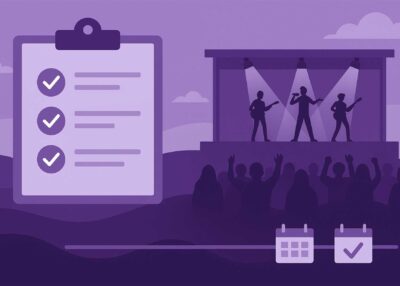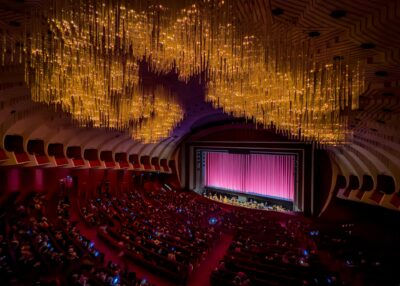Amplifying Your Event's Online Visibility: 10 Essential Tips for Every Event Planner
In the digital age, where countless events jostle for attention in the crowded space of the Internet, standing out is both challenging and crucial. For event planners, the goal is clear: make your event so visible online that your target audience cannot miss it. However, the pathway to achieving this visibility is often less apparent.
Enhancing an event's online presence requires a blend of creativity, strategic planning, and digital savviness. Below, we delve into practical steps and insider tips that can elevate your event's digital profile, drawing the audience numbers your event deserves.

1. Understand Your Audience Inside Out
Before you begin any form of promotion, it's vital to know who you're trying to reach.
- What platforms do they frequent?
- What kind of content do they engage with?
- What are their online behaviors?
Tailoring your online strategy to your audience's preferences will increase the efficacy of your promotional efforts exponentially.
2. Optimize for SEO
Search engine optimization (SEO) is a powerful tool for increasing your event's online visibility. Integrate relevant keywords, meta descriptions, and tags in your event description and website content. If you're posting blogs related to the event, thorough keyword research and incorporation are essential. SEO extends beyond text - ensure your images and videos are also optimized with relevant tags and descriptions.
Increasing event visibility through Search Engine Optimization (SEO) is crucial in the digital age. Here are quick, effective tips for enhancing your event's online presence using SEO strategies:
Keyword Optimization:
-
- Research and use event-related keywords that potential attendees are likely to search for.
- Include these keywords in your event title, description, and website content, but avoid keyword stuffing.
Optimize Metadata:
-
- Create compelling meta titles and descriptions for your event page, incorporating primary keywords.
- Ensure that metadata is the appropriate length and entices users to click through.
Mobile Optimization:
-
- Ensure your event website is mobile-friendly. A significant amount of searches happen on mobile devices.
- Google and other search engines favor mobile-optimized sites.
Use Schema Markup:
-
- Implement event schema markup on your website. This helps search engines understand the specifics of your event and can enhance how your listings appear in search results.
Leverage Local SEO:
-
- If your event is location-specific, optimize for local search by including the city or venue name in your keywords.
- Use Google My Business for added visibility.
Quality Backlinks:
-
- Obtain backlinks from reputable sites. Partner with influencers, local businesses, or media sites to link back to your event page.
- Write guest posts for popular industry blogs and include links to your event.
Content Marketing:
-
- Create valuable, shareable content related to your event. Blog posts, interviews with speakers, or event previews can drive traffic and improve site authority.
- Update content regularly to keep the website dynamic and interesting.
Optimize Images:
-
- Use high-quality, relevant images related to your event.
- Optimize image file names and alt text with relevant keywords to improve their search visibility.
Increase Site Speed:
-
- Optimize your website’s loading time, as search engines penalize slow websites. Compress images and use efficient coding to improve performance.
Use Social Media:
-
- Integrate your efforts with social media. Although social signals are not a direct ranking factor, they can increase visibility and traffic to your event page.
- Share links to your website content on social media platforms to drive more traffic.
Monitor and Analyze:
-
- Use tools like Google Analytics to monitor your website traffic, understand user behavior, and determine which aspects of your SEO strategy are working.
- Adjust strategies based on data-driven insights.
Encourage Reviews:
-
- Positive reviews (particularly Google Reviews) can influence your event's visibility. Encourage attendees to leave reviews after the event.
Consistent NAP Information:
-
- If you mention your event’s name, address, and phone number (NAP) online, ensure it’s consistent across all platforms and directories.
Secure Your Website:
-
- Use HTTPS as a secure protocol. Google gives preference to websites that are secure and trustworthy.
3. Harness the Power of Social Media
Create a robust social media strategy encompassing organic posts, event pages, paid advertisements, and interactive content. Regularly update your content and engage with your audience's comments and messages.
- Create Hashtags: Develop a unique, catchy hashtag for your event and use it across all social platforms. Encourage your followers to use it, too, creating a buzz around your event.
- Leverage Stories and Live Features: Use Instagram Stories, Facebook Live, or Twitter Spaces to share real-time updates, behind-the-scenes sneak peeks, or live Q&A sessions.
- Social Media Ads: Invest in social media advertising, utilizing sophisticated targeting options to reach potential attendees outside of your network.
4. Collaborate with Influencers and Bloggers
Influencers and bloggers can act as a catalyst, increasing your event's visibility exponentially. Identify reputable figures within your event's niche and reach out for collaborations. They could share your event, post about their participation, or even be involved in the event, such as being a speaker.
Their endorsement can lend credibility and extend your reach to a broader audience.
5. Utilize Event Listing Websites
Platforms like Meetup or AllEvents are frequented by individuals actively seeking events to attend. Listing your event on these platforms can significantly boost visibility. Ensure your listings are compelling, providing all necessary details and integrating select keywords.
Popular event listing websites include:
- Purplepass
- Meetup
- Facebook Events
- Eventful
- Goldstar
- Spingo
- 10Times
- AllEvents.in
- Zapaday
- Ticketmaster
- Bandsintown
- Resident Advisor
- Brown Paper Tickets
- Splash
- Lanyrd
6. Email Marketing
Emails are one of the most direct forms of communication with potential attendees. Create an engaging email campaign with a catchy subject line, compelling content, and a clear CTA (Call To Action).
Segment your audience for more personalized, targeted content, increasing the chances of higher engagement rates.
7. Engage in Community Forums and Groups
Online communities and forums like Reddit, Quora, or niche Facebook groups can be goldmines for promoting events. Participate in discussions, provide genuine insight, and strategically lead up to introducing your event without making it feel like a hard sell.
8. Leverage Multimedia
Create engaging videos, infographics, or podcasts related to your event's theme.
Multimedia content is highly shareable and can communicate your message more effectively. An event trailer, interviews with speakers, or thematic infographics can generate excitement and encourage shares, further increasing visibility.
Leveraging multimedia for event promotion is a dynamic and engaging approach. Here are some ideas:
- Teaser Videos: Short, intriguing videos that hint at the event's highlights.
- Image Galleries: High-quality photos from past events or behind-the-scenes preparations.
- Infographics: Visual statistics about the event, e.g., attendee demographics, speaker topics, or event growth figures.
- Interactive Content: Quizzes or polls about event themes, guest preferences, or industry trends.
- Live Streaming: Real-time broadcasting of pre-event activities or teasers, engaging audiences and building anticipation.
- Webinars: Online seminars related to the event theme, featuring guest speakers or previews of the event content.
- Podcasts: Event-themed discussions or interviews with speakers, sponsors, or past attendees.
- Virtual Tours: 360-degree video tours of the event venue or sneak peeks of setup areas.
- Animated Content: Animated videos or GIFs explaining the event, the schedule, or unique selling propositions.
- Email Newsletters: Multimedia-rich emails featuring videos, images, and interactive links.
- Social Media Stories: Short, engaging, visual stories shared on platforms like Instagram, Facebook, or Snapchat.
- Countdowns: Interactive, visual countdowns to the event date, shared on various platforms.
- User-Generated Content: Encouraging attendees to share their own multimedia content, like videos or photos, with a dedicated event hashtag.
- Augmented Reality (AR) Experiences: Innovative AR content, like virtual event swag or interactive posters.
- Event Apps: Custom mobile apps featuring multimedia content, event info, schedules, and attendee interaction.
9. Paid Advertising and Retargeting
Beyond social media advertising, consider Google Ads or other forms of paid online advertising. Use retargeting strategies to re-engage individuals who have visited your event page but didn't complete the registration.
10. Monitor and Adapt with Analytics
Use web and social media analytics to track your promotional activities' performance. Understand which posts your audience engages with most, the platforms driving the most registrations, and areas where the strategy is falling short. Use these insights to adapt your approach in real time for maximum effectiveness.
Conclusion: Making an event visible online is akin to art - it requires creativity, consistency, and a clear understanding of the digital landscape. Event planners need to employ a mix of strategies, ensuring they cover all bases from SEO to social media, email marketing, and effective use of analytics.
In the ever-evolving digital space, staying abreast of trends and audience preferences, and being willing to innovate and adapt your promotional strategies can set your event apart, ensuring it captures the attention it truly deserves. Remember, the goal isn't just to be seen; it's to resonate with your audience so compellingly that they are inspired to participate.






